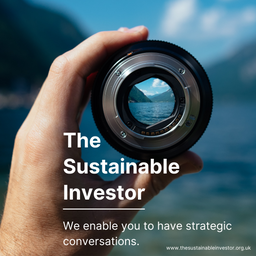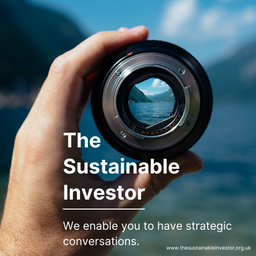Sunday Brunch: valuation and sustainability are about the future - but the overlap is not perfect
Companies (and many of their shareholders) respond best to issues that impact their long term profitability. Sustainability issues are often strategic issues for companies, with clear valuation creation implications. But not all sustainability issues have financial implications.
Both valuation and sustainability are are all about the future. Sometimes the distant future. It's a concept that many people seem to struggle with. For investors what happens in the next few years is not the main issue. It's more about the long term. The real value of a company comes from the cashflows it will generate in the future, out for the next few decades. And if it's growing or shrinking.
“As I often remind our analysts, 100% of the information you have about a company represents the past, and 100% of the value depends on the future." Bill Miller - CEO Legg Mason
One conversation I used to have a lot was about what a company is worth, and what management teams can do to make the company more valuable. And the short answer normally was 'invest in the changes that are coming'.
This has a direct relevance for sustainability issues and how we link them to financial value creation. Sustainability is mostly a longer term challenge for companies. As a value creation issue this makes it similar to many of the other strategic challenges that companies face.
As with the other strategic challenges they face, we want companies to invest in the sustainability issues that are coming, even if they appear to be a distant risk or opportunity. And the reason they (most of them anyway) will do this is not because it's the right thing to do, but because preparing for the future is a sensible value creation thing to do.
If a company keeps on doing the same thing as before, as the world around them changes, they become less and less relevant. Sales, profits and cashflows fall. And as this path becomes clearer, their shares are worth less. And their debt lenders are taking more and more risk.
And waiting can mean that by the time they act, it's too late.
The business case for acting on sustainability
This is the core of the business case for companies investing in the sustainability issues. Act not because it's a good thing to do, but because it creates value for your investors.
BUT remember, not all sustainability issues are value creation issues.
We need to be able to identify the difference and act accordingly.
Where we want a company to respond to an issue because it has potential impacts on their long term value creation, we should be emphasising the financial benefits, and costs of inaction. And making the case that even if the impacts are not yet visible, they will be soon (and by soon I mean the next 3- 5 years, or for some industries out into the next decade). A good example of this would be the impact of climate change on the supply chains of food companies.
For those issues where the challenge is unlikely to have a financial impact, even in the longer term, then our approach needs to be different. We could focus on influencing politicians and regulation, so that the issue ends up becoming more direct for the company. Or we could highlight the risks around a company licence to operate, the so-called social licence.
And for asset owners, we could discuss the universal owner approach, where by acting they protect their wider portfolio and the non financial interests of their stakeholders.
Asking companies to act on this second group of issues is a big ask, one that we may struggle to deliver on.
Remember, the impact on the company doesn't have to be guaranteed.
Shareholders also want companies to prepare for risks and opportunities that may come about, even if they are not certain.
And the impact doesn't have to be immediate. For investors the value of a company is driven by future profits, often way out in the future. And a company that prepares for this distant future, and creates a competitive advantage that lasts, is worth a lot more to investors. And this includes those companies that act on the relevant sustainability issues now, rather than waiting.

Embedding sustainability in strategy needs to be selective
There is an increasing understanding that if we want companies to act on sustainability issues, then we need to be able to show the financial benefit. Financial benefit can be for companies via higher profits, lower risk and/or the ability to sustain competitive advantage for longer. Alternatively it can be for investors via higher risk adjusted financial returns.
There has been an increasing amount of research on this topic. A recent example is a report from Schroders and the Rethinking Performance Initiative at Oxford University’s Saïd Business School on the question of do companies that deliver impact also deliver financial alpha (basically share price performance that beats the index).
How can this work in practice, or putting it another way, what sustainability issues should we focus on when we talk to companies about financial value creation? Regular readers will know that I often return to the research of Alex Edmans. One aspect of his work looks at which sustainability issues actually make a financial difference.
One comment he made in relation to his work on the link between financial value creation and employee satisfaction is worth repeating....
I didn’t study employee satisfaction because it’s an ESG factor, but because it’s a value relevant factor. I wanted to show that the market overlooks important value drivers, and titled the finance paper “Does the Stock Market Fully Value Intangibles? Employee Satisfaction and Equity Prices”.
He pulled together a lot of his thoughts on this topic in a recent research report entitled "The End of ESG". Its really worth a read if you want to understand in more detail how we can identify which sustainability issues are likely to be financially material and how we can then think about getting companies to act.

Just because some sustainability issues can enhance financial returns doesn't mean that ALL sustainability issues are financially material. We need to remember this when we ask companies to embed sustainability in their strategy process.
One last thought
There is a massive benefit to investors and asset owners from focus. Picking the small number of sustainability issues that will be most material for the company and/or sector in question. And working on those until companies act. The issues will differ between companies, although we can reasonably expect that companies in the same industry will face similar key issues. For food companies the big issues look to be healthier diets and climate resilient supply changes.

Please read: important legal stuff.





